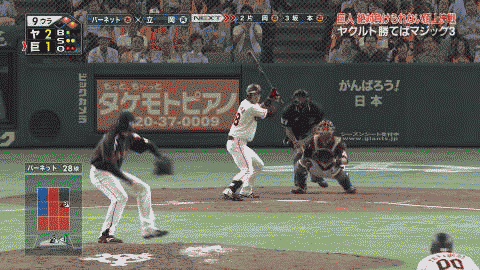Tony Barnette had an idea of what to expect in 2009 when he signed with the Tokyo Yakult Swallows after a lackluster season with the Arizona Diamondback's Triple-A team. Every player in that position does; the pipeline from stymied Quad A careers to Nippon Professional Baseball has been open long enough to generate its own clichés. The answer, in terms of what to expect, is "the culture may be different, but baseball stays the same." Say it often enough, and it can even start to seem true.
Advertisement
The problem, Barnette found, is that the stock answer could not be further from the truth. Everything is different in Japan, down to the baseballs themselves. "The ball's tackier in Japan," Barnette told me. "When you get a new ball, it's wrapped in tin foil and comes in a sealed plastic package. In the US, it's wrapped in tissue paper in a cardboard box. The leather stays softer when you wrap like you do in Japan; it's slicker in the States." So, to revise in terms of what to expect: "the culture is different, and also nothing else is the same."
NPB did not even move to a standardized baseball until 2011, which meant Barnette spent his first year toggling between blends made by as many as nine manufacturers. "I never really got the hang of that," he says. "I'd be halfway through my bullpen and they're like, 'You're using the wrong ball.' I'm like, 'Come on, guys.'" There's some annoyance in the story as Barnette re-tells it, but less annoyance than amusement. He almost sounds wistful, in fact. For the first time in six years, Barnette will not be playing baseball in Japan. Instead, the 32-year-old reliever will be pitching for the Texas Rangers; the club signed him on a two-year guaranteed deal this winter. The culture will be different, but the baseball will, finally, be the same.Barnette's deal with the Rangers made for a surprising transaction, not because of Barnette's ability, but his background. There's no shortage of Americans playing in Japan, but the overwhelming majority wind up there when their big league careers go bust; a small handful of those eventually boomerang back across the Pacific Ocean. Barnette is the elusive third type—a soon-to-be rookie who established himself in Japan before he ever sniffed Major League Baseball.Read More: Can Raimel Tapia's Swing Trump Baseball's Conventional Wisdom?
Advertisement
"It really, truly won't set in until I actually make it to the stadium and see the facility and start mingling with the guys," Barnette said by phone in January from his home in Phoenix. Two months later, at the Rangers spring training in Surprise, Arizona, he confirmed that it's still pretty weird. It has been a long trip home.
Barnette's Major League debut has been a decade in the making. Photo courtesy of Kelly Gavin, Texas Rangers.
Barnette was born in Anchorage but graduated high school in Auburn, Washington. From there, he hit the road. His pitching odyssey began at Central Arizona College, a junior college in the town of Coolidge, Arizona, population 11,887. He eventually transferred to Arizona State, and with the jump in competition came an adjustment in roles, from closer to long reliever and, finally, starting pitcher. The Diamondbacks selected him in the 10th round of the 2006 draft and Barnette advanced, steadily if unspectacularly, up the minor league ranks. But after climbing four levels in as many years, he plateaued at Triple-A in 2009, compiling a 5.79 ERA in his age-26 season. Arizona left him unprotected in the following year's Rule 5 Draft. Nobody bit.Barnette was resigned to another year in the minors when he caught wind of the Swallows' interest in him. It was unusual for a Japanese team to be so interested in a player who hadn't cracked a big league roster, and it came about in an unusual way—Yakult's international scout discovered him at a spring training game in which Barnette wasn't scheduled to pitch; he only filled in to eat innings when the starter got knocked out early. The NPB deal gave Barnette an opportunity that seemed foreclosed upon in the states, but it came at the cost of reconciling with who he was as a player, and how far he was from where he'd always dreamed of being.
Advertisement
"You hear stuff [like this] happening but as a young guy, you think, 'It's not me, I'm going to The Show,'" he says. "Then, all of a sudden, it's very real. And you're sitting there trying to make life decisions at 26."That included marriage. His girlfriend, Hillary Jones, was still in college when Barnette got the call; staying together required committing to a long-distance relationship that spanned the Pacific Ocean. When they married two years later, she joined him in Japan, a country where she had no career and knew no one besides her husband. And when they had their first child in 2014, a daughter named Madelyn, the Barnettes grappled with the struggles and strangeness of new parenthood while thousands of miles away from family, in a country with customs unlike the ones they'd always known.Everything was different, and not necessarily in the most thrilling of ways. Rangers starting pitcher Colby Lewis, Barnette's new teammate, spent the 2008 and 2009 seasons pitching with the NPB's Hiroshima Carp; one of the best perks he cites about his 2010 return to Texas is, "I got to be able to put my wife and kids—wife and kid, at the time—back on MLB insurance." The passage of the Affordable Care Act forced the Barnettes to take out two separate policies—one in the United States, thanks to their permanent address in Phoenix, and a second global policy to cover them when in Japan. "That was a fun experience," Barnette says ruefully.
Advertisement

But there was also adventure, and Tony and Hillary made a point of trying to get as much of it as they could. They took in sumo wrestling and saw the mountains; when Tony was on the road, Hillary spent her days studying Japanese and hiking through parks and to waterfalls. After late home games, their favorite postgame activity was to hop on their bikes and ride through the streets of Tokyo at midnight, as the rest of the city slept."The bustling city you see in the day slows down in a lot of places," Tony says. "You go down these dark back alleys and you see communities inside of communities, inside of communities. You talk about a country that was built to the sky, not outwards. To explore the city by bicycle in the dead of night, when nobody was around, was awesome."Gradually, the pair grew comfortable with the idea of Tony closing out his career in Japan. A rough first season in the rotation gave way to a return to the bullpen, and it suited Barnette's tenacity on the mound. The advent of the standardized ball was the final acclimation and soon Barnette blossomed into one of the most feared closers in Japan, saving 33 games with a 1.82 ERA in 2012, his second year in the role.Barnette was even better last season, saving 41 games and tallying a 1.29 ERA, each a league-best among closers, to help push the Swallows to their first Japanese Series appearance since 2001. It wasn't the way he'd envisioned it—it was an ocean and a universe away, in fact—but Barnette had cemented himself as a premier player, was making good money on a championship contender, and was living in one of the world's great cities. It wasn't The Show, but it was pretty damn good. "If that's my mountaintop, that's my mountaintop," he told himself.
Advertisement
Instead, Barnette received word that, finally, there could be a place for him in the major leagues. The Rangers were among several teams showing interest, identifying the velocity and downward movement on his pitches as an ideal fit for their groundball-oriented relief corps. Barnette had the option to sign outright as a free agent, but instead exited Japan as uncharacteristically as he arrived. He opted into the country's posting system as a gesture of loyalty to the team that plucked him out of career purgatory, and while the ultimate $500,000 fee that the Rangers paid the Swallows for Barnette was a pittance compared to the ransoms Yu Darvish and Masahiro Tanaka demanded, the symbolism mattered more than the money. "I have a soft spot in my heart for the organization," Barnette says. "It was a way to show I was grateful in more than just words."
Barnette signed a two-year deal with the Rangers this offseason. Photo courtesy of Kelly Gavin, Texas Rangers.
It was a challenging farewell, and coming back to the states meant another round of acclimating. The Barnettes miss Tokyo's community and the friendships they made, but also miss the city's unique embrace. Barnette runs them down—the stranger in a grocery store who comforted a crying Madelyn by giving her a stuffed animal and then nonchalantly going about his day, the vending machines that dispensed umbrellas, the pride shopkeepers felt about keeping their curbs pristine. ("Like, 'This is mine, I'm going to keep it clean," Tony says. "That's kind of weird. It's unfortunate that it'd be weird.")Although he occasionally grew weary of the onerous preseason workouts, Barnette felt liberated by Japan's open-minded pitching culture, which encouraged experimentation and allowed him to maintain his starter's repertoire in relief. "They weren't trying to limit me," he says. "Nobody was sitting there telling me I had three pitches and that's it. 'You also have a curveball and split to go with your fastball, slider and cutter? Then you would have five pitches!'"But leaving it all behind was worth it for nights such as the one Barnette experienced in early January, he says. For six years, that time of year meant packing, and preparing to usher his family back into the corporate housing that Yakult provided for the next ten months. Now, it doesn't have to mean anything. A rainstorm was rolling through town but otherwise it was a lazy Thursday evening at home in Arizona. Two-year old Madelyn squealed happily in the background. Tony was in the other room, reminiscing about Japan. "I'm kind of freaking out a bit, to be honest with you," he admits. None of it seems real. His instincts still whisper at him to start clearing out his closets. It's a strange thing to have a home, let alone with a Major League team.But that's where he is. Tony Barnette is a big leaguer now, and with that comes new responsibilities and routines. He's still weeks away from tackling the ones on the pitcher's mound, so he focuses on what he can, which is unpacking his thoughts. Tony, relax, he tells himself. You're going to be here. This is paid for. Get comfy. Don't look at your suitcases yet. You've got time.
